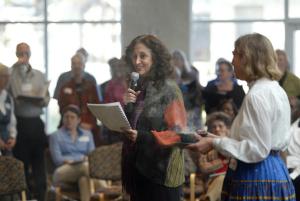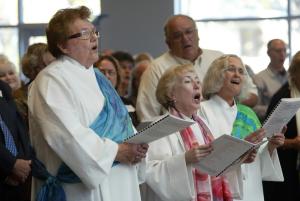By Tom Fox
National Catholic Reporter
July 10, 2008
http://ncronline3.org/drupal/?q=node/1402
Rabbi Susan Talve, spiritual leader of the St. Louis Central Reform Congregation, host to last November’s ordination of two Catholic women, reacting to an NCR news story that the St. Louis archdiocese had video recorded the ceremony, said July 9 the archdiocese had never asked permission and had it done so, she would have denied it.
“They didn’t ask. Had they done so, I would have politely said ‘no.’ There were simply too many vulnerable people gathered there,” she said.
 |
| Rabbi Susan Talve, spiritual leader of Central Reform Congregation in St. Louis, welcomes worshipers for the ordination of three women last November. Photo by Karen Elshout |
The archdiocese authorized someone to record the rite and then used the recording, along with photographs apparently taken from the video, as evidence to punish a Catholic nun who attended the liturgy, according to several people familiar with the case.
Sister of Charity Louise Lears was forced out of all church ministerial roles and banned from receiving sacraments within the archdiocese by an edict of St. Louis Archbishop Raymond Burke announced June 26.
The next day the archdiocese announced that Burke had been reassigned to a position at the Vatican as prefect of the church’s highest canonical court, the Apostolic Signatura.
Lears, 58, has been a member of the pastoral team at St. Cronan Parish in South St. Louis for the past three years, and a coordinator of religious education in the archdiocese.
She refused to be interviewed for this article. She is not speaking to the media.
However, several people familiar with the documents, prepared by the archdiocese that made up the case against her, strongly criticized what they called the “surveillance” video-taping.
 |
| Rose Marie Dunn Hudson, on left, sings along with fellow womenpriest Bridget Mary Meehan of Pittsburgh, Pa. , center, during Hudson's ordination at the Central Reform Congregattion last November. Karen Elshout |
One of the confidential archdiocesan documents, according to knowledgeable sources, was an affidavit giving permission to an individual to attend the ceremony in order to record it. The record of the ceremony is contained on two electronic discs in Lears’ file.
The file also contains close-up photographs of a name tag Lears was wearing during the ceremony. Her attendance at ordination was never a secret, according to Lears’ associates.
The ceremony drew some 600 people, among them several dozen women religious, according to people who attended the liturgy. Only Lears, however, was singled out by Burke.
“It was a surveillance video. That’s exactly what it was,” said Sean Collins, a co-pastoral associate of Lears at St. Cronan Parish until he resigned July 2nd, in part, he said, to speak about what he says has been a grave injustice taken against Lears.
“What disturbs me even more is that the video taping was premeditated,” he said, referring to the affidavit authorizing it by the archdiocese. Collins did not see the document firsthand, but referred to others who had seen it.
“They clearly selected Louise from a congregation of some 600 people and of those 40 or 50 of them offered blessings,” he said. “Of all of those who offered blessings only Louise has been singled out.”
NCR made several unsuccessful attempts to reach Burke for comment through the archdiocese and the Apostolic Signatura in Rome, but he was unavailable. There is no evidence that Burke knew about or ordered the taping. However, Catholics familiar with the workings of the archdiocese say it would be unlikely it could have happened without his authorization.
News of the planned ceremony at the time prompted outrage from archdiocesan officials -- outrage that was directed both at the women aspiring to the Catholic priesthood and toward the woman rabbi who agreed to host the event.
Before the ceremony Burke wrote to Talve, senior rabbi at the synagogue, urging her to revoke her offer of hospitality. Talve is the founding rabbi of Central Reform Congregation, a former president of the St. Louis Rabbinical Association and herself active in interfaith affairs.
Days before the liturgy Burke, in the archdiocesan newspaper, the St. Louis Review, also wrote a column reiterating the Catholic church’s official position that women cannot be ordained to the priesthood and that participation in any such liturgy would be a gravely sinful act. “Any Catholic,” he wrote, “who knowingly and deliberately assists… risks the eternal salvation of their souls.”
That threat is the apparent reason an archdiocesan affidavit was required to permit someone to attend and video the liturgy.
If Lears were to appeal her punishments through church channels her case could end up at the court that Burke now heads. However, he has said he would recuse himself from cases before the court in which he is involved.
The two Catholic women ordained in the synagogue were part of the Womenpriests movement, efforts by Roman Catholic women to gain equality of ministry within the Catholic church. They were Elsie Hainz McGrath, a retired writer and editor for a Catholic publishing house, and Rose Marie Dunn Hudson, a former teacher.
In March, Burke excommunicated the women.
Many people have speculated why Lears was singled out. Several said the reason might have been because she worked in an archdiocesan parish. Others said that McGrath and Hudson had been members of the St. Cronan Parish.
Tom Fox can be reached at tfox@ncronline.org
Any original material on these pages is copyright © BishopAccountability.org 2004. Reproduce freely with attribution.